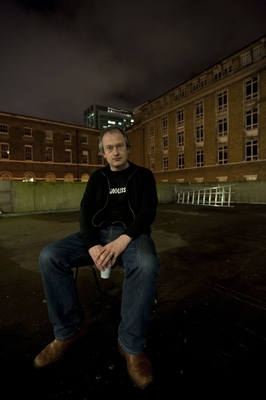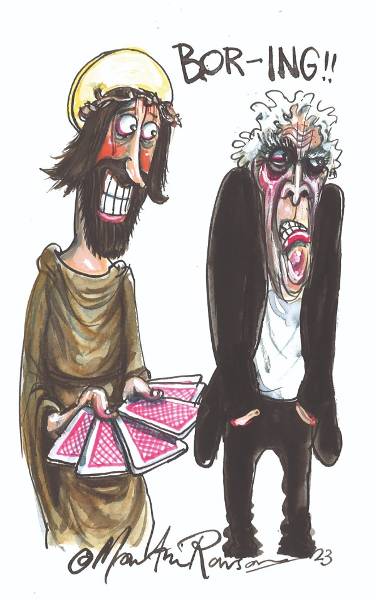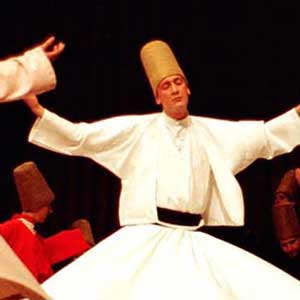 Comedy and religion have always had a mutually antagonistic relationship, as any child who has been ambushed by a fit of giggles in church knows all too well. Comedy, by its very nature, has to be irreverent; it sticks its tongue out at authority, mimics and mocks and bursts the inflated self-importance of any institution or person that takes itself too seriously. In The Name of the Rose, Umberto Eco’s monastic medieval thriller, the book at the heart of the mystery is Aristotle’s lost work on Comedy; those who regard themselves as the servants of God would rather kill than allow it to be widely read, in case it should legitimise irreverence and undermine the fear of the Almighty that kept men obedient.
Comedy and religion have always had a mutually antagonistic relationship, as any child who has been ambushed by a fit of giggles in church knows all too well. Comedy, by its very nature, has to be irreverent; it sticks its tongue out at authority, mimics and mocks and bursts the inflated self-importance of any institution or person that takes itself too seriously. In The Name of the Rose, Umberto Eco’s monastic medieval thriller, the book at the heart of the mystery is Aristotle’s lost work on Comedy; those who regard themselves as the servants of God would rather kill than allow it to be widely read, in case it should legitimise irreverence and undermine the fear of the Almighty that kept men obedient.
God has yet to speak publicly about his feelings on being satirised, but in the meantime his supporters can be extremely vocal, and some of them get very worked up on his behalf. From Mary Whitehouse’s outcry against Python’s Life of Brian to the petitions and public protests against Jerry Springer the Opera to the Danish cartoons of the Prophet Muhammad, the self-appointed defenders of religion and comedians have often found themselves going head-to-head – sometimes with the threat of violence – over how much offence is permissible in the name of humour.
Perhaps it seems self-evident, then, that many comedians would call themselves atheists, or at least have greater sympathy with those who choose not to identify with any faith group. But the seeds of the alliance between comedians, secularists, sceptics and scientists that has grown up in the past couple of years around such events as Robin Ince’s Nine Lessons and Carols for Godless People and the Atheist Bus Campaign were sown in the middle of the last decade around two related incidents.
The first was the hate campaign unleashed by the rightwing fringe group Christian Voice against the comedy show Jerry Springer the Opera, written by Stewart Lee and Richard Thomas. Based on a misrepresentation of the show’s content, Christian Voice’s leader Stephen Green had set out to make Jerry Springer the rallying cry for disgruntled Christians who were tired of what they perceived as the media’s willingness to ridicule Christianity while tiptoeing around Islam and other faiths.
Despite having only a handful of members, Christian Voice’s complaints led to Sainsbury’s refusing to stock the DVD and a number of the UK tour venues cancelling out of misguided fear of prosecution under blasphemy laws. When the BBC went ahead and broadcast the show on 8 January 2005, despite 45,000 advance complaints, some BBC executives were advised to go into hiding after details of their home addresses were published on the internet.
Only a month earlier, comedian Rowan Atkinson had spoken publicly as part of a campaign against the government’s proposed incitement to religious hatred bill, explaining to a meeting at the House of Commons that there were “quite a few sketches” he had performed in the past that could fall foul of the new law. Joining forces with the writers’ free speech organisation English PEN and the National Secular Society, as well as prominent artists and writers such as Ian McEwan and Nicholas Hytner, Atkinson became a passionate advocate of comedy’s fundamental freedom to challenge, criticise and mock ideas, even if those ideas took the form of sincerely held religious beliefs.
Jerry Springer the Opera was cited as an example of how fear of prosecution could cripple a show and might lead to future self-censorship by comics. Lee is a popular and much admired figure on the alternative comedy circuit and the ferocity of the persecution directed against him and his colleagues inspired a sense of resistance among like-minded comedians against religion in general.
“What happened with Jerry Springer was a shock and I think it did galvanise people, in that it pushed that issue into the open,” says comic Al Murray. “I was invited on television to defend what I regarded as a fairly uncontroversial show and it was strange to find myself involved in a debate that most comics of my generation thought had ended with Life of Brian.”
It seemed the battle lines had been drawn once again, with comedians, secularists and free speech advocates on one side, and the easily offended religious on the other.
But it was the stand-up comic and amateur science enthusiast Robin Ince (pictured above) who devised a show that would turn that combative stance into a positive and celebratory alliance, whereby those who felt themselves threatened by a newly invigorated religious right could unite, not in a spirit of defensiveness, but in celebration of all that was worthwhile in their worldview – a worldview defined not by faith but by reason and science.
Nine Lessons and Carols for Godless People, now in its third year, was conceived as a festive opportunity for non-religious people to get together, laugh, sing and renew a sense of wonder about the universe in the company of eminent comedians, scientists, philosophers and musicians. Ince is unhappy with the “atheist comedy” label, though. “I wish I could change the name,” he admits now, “but I don’t think I can because it’s established. But it was never meant to be about saying there’s no God. The word ‘Godless’ is there to say that it’s for people who haven’t got a god but still think we have something worth celebrating.”
Despite his conciliatory tone, the idea for Nine Lessons was born out of confrontation, during a television debate, again with Stephen Green, who, on the strength of the Springer protest, had carved out a media profile for himself despite representing the views of a tiny minority of extremists within that faith. “To everything I said, he just kept saying, ‘You want to ban Christmas,’” Ince explains, “so I thought, right – I’m going to put on a really celebratory event for people who like Christmas but may not go to church because they don’t believe those things. The only thing that will make people give up the comfort blanket of mysticism is by showing them wonder, not by going, ‘Your book is stupid.’’’
The inclusion of Richard Dawkins in the line-up may have fuelled the impression that the shows were a collective of sneery atheists gathering behind closed doors to stick smug fingers up at religion, but anyone who has witnessed Dawkins on stage at one of these gigs, waxing lyrical about the wonders of crystal structures, might be baffled by the shouty, foot-stamping media caricature of him.
For comedian Josie Long, there is a value in gathering together and experiencing a sense of community.
“It’s really important that people feel they have a voice and that it’s okay to believe these things,” she says. “I really enjoy the sceptic nights because it’s about creating our own ritual and celebrating the beauty in the universe, it’s a joyous way to celebrate sceptic culture. Comedians are fond of finding stuff out and asking why so we have that in common. There’s a certain nerdiness about comedy anyway.”
With scientists and sceptics thrown into the mix, the range of comic targets broadened to include not just conventional religion but anything that might be classified in the category of “Woo”: alternative medicine, New Age spirituality and any group that makes wild claims of a vaguely scientific nature without reliable evidence, as embodied in Tim Minchin’s beat poem “Storm”. In 2008, “Woo” became the new arch-enemy and the science-atheist-comedy-free speech movement (if it can be described as anything so coherent) gained a new poster boy to replace Stewart Lee when popular science writer Simon Singh, a regular contributor to Nine Lessons, was sued by the British Chiropractic Association following an article in the Guardian. His supporters gathered in a coalition of scientists, writers, politicians, sceptics and comedians – many of them familiar to Nine Lessons audiences - to create the Libel Reform campaign, complete with its own comedy/science benefit gig, a campaign that has since made important advances towards changing UK libel law.
Given the success of Nine Lessons – the shows now sell out almost as soon as the run goes on sale – and the rise of what could seem from the outside like a rather cosy collective of people who all agree with each other, perhaps it was inevitable that the idea of science- and atheism-based comedy would draw a backlash. More surprising is the criticism that has come from people you might expect to be more supportive of the idea. Roger Highfield, editor of New Scientist, reviewing the show last year for the magazine, accused Ince and company of “preaching to the converted” and contrasted their approach with that of Eddie Izzard’s recent show, which also touched on themes of religion and science. “Someone like Izzard … has the power to take the rationalist message to a new level and, more importantly, to a new and broader audience,” he wrote.
Comedian Marcus Brigstocke, who joined Ince, Singh and others for the Libel Reform gig but has not been part of the Nine Lessons shows, is also wary of the dangers of atheist comics assuming an intellectual superiority. In his 2009 show God Collar (soon to become a book), he talked honestly about his heartfelt wish that he could believe in a God, at one point slapping down anyone in the audience who eagerly self-identified as an atheist: “You’re not cleverer than anyone else, so pack it in!”
“I don’t want to have to wear the T-shirt of the brother-and-sisterhood of atheists, that’s best avoided,” he says. “I hope that people will eventually feel free to discuss interesting ideas anywhere on the comedy circuit without it having to be a specialist ‘atheist’ gathering. As a comic you can talk about what you want as long as you’re bold enough to set your own agenda and take those atheist ideas to people who aren’t expecting it.”
This “preaching to the converted” criticism understandably makes Ince frustrated. “Most of the people who come to Nine Lessons are still arts people, and I get emails every day from people asking me the names of the science books that were mentioned in the show. I’ve always tried to avoid making the shows too overtly atheist for that reason, because then you are in danger of becoming smug.”
But he also points out that, from his own experience of performing his science-based shows around the country – including the Greenbelt Christian arts festival – the idea that there is an impossible divide between rationalists and believers is largely a media fiction. “People write to me saying they brought their girlfriend who’s a Christian and she really enjoyed it. That’s one of the things I want to work on. I wish more religious people would come to Nine Lessons, but I can understand why the title puts them off.”
Simon Singh agrees that the accusation of exclusivity is not borne out by the evidence of the shows. “We have three distinct audiences – science, comedy and atheists, and there may be atheists who need persuading that science is fascinating, and scientists who haven’t thought much about humanism. But I see a lot of teenagers at these gigs, who may go through school being told that they’re geeks and science is uncool. Seeing scientists on stage with comedians in front of 3,000 people sends them home with the message that science is an incredible adventure.”
I ask Ince if there will be an angrier tone to the shows this year, with secularists infuriated by the vast expense and public deference during the Pope’s recent visit, and scientists up in arms about cuts to science funding. Are people feeling embattled again?
“I doubt the Pope will get a mention,” he says, “though I suspect Brian Cox will have a few graphs on science funding. I don’t think it will be angry but it may well be more forthright. Every time someone like Simon Jenkins writes a piece attacking science you realise that we do need to keep on speaking up. But I think people are feeling that on so many levels at the moment with this government.”
But anger, says Brigstocke, is counter-productive if comics or sceptics mean to be more than self-congratulating. “If your aim is to convince people that life without religion is worthwhile, then you mustn’t be ugly about it, and it’s very easy to be ugly when you’re angry. Religion can provoke a lot of anger.” He sighs. “Unfortunately, being angry is funnier. Being nuanced and balanced is the death of humour.”
But while there is still opposition to it, atheist comedy looks unlikely to slip away quietly. “There’s an anti-establishment feeling common to all those groups, a refusal to accept what we’re told,” says Murray, “so for as long as there’s an established church, that will always be part of what we do.” Amen to that.
Slideshow of more pictures from the previous two year's Nine Lesson shows.
Nine Lessons and Carols for Godless People is at the Bloomsbury Theatre, London, 16-22 December. Tickets: 020 7388 8822. Unfortunately it is sold out, but all subscribers to New Humanist will get a 1-hour DVD of choice bits from the first run in 2008 featuring Robin Ince, Richard Dawkins, Stewart Lee, Simon Singh, Richard Herring, Josie Long, Isy Suttie & Gavin Osborn, and very special guest Jarvis Cocker. Not a subscriber? Take care of that here (you'll get a free pack of God Trumps too)

